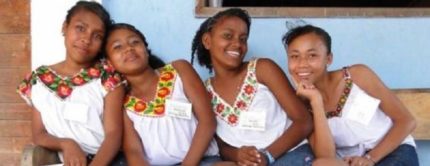They typically live in rural areas, making up a large segment of Colombia’s poor and those whose husbands and sons would most likely be caught up in the ongoing civil war between the Colombian governments and the Revolutionary Armed Forces of Columbia (FARC).
So it’s only natural that Afro-Colombian women should have a seat at the table when government and rebel officials meet in Havana, Cuba later this month for the second phase of the peace talks, argues Gimena Sánchez-Garzoli, a leading Columbia human rights advocate for the Washington Office on Latin America, in a blog.
But the role of Afro-Colombia women in guaranteeing a successful peace effort requires support from the international community because they are hardly represented as part of the FARC or in the Colombian armed forces’ top command structures.
Incorporating the perspective of Afro-Colombian women into the issues debated at the peace talks will not only dramatically increase the odds that the process will succeed, but will strengthen Colombia’s democracy by bridging the political gap that exists for Colombian women and ethnic minorities and stabilize the post-conflict country.
The term Afro-Colombians refers to Colombians of African ancestry as Spaniards first began importing African slaves into Columbia in the early 16th century.
Slavery was abolished in the country in 1851, but life continues to be hard for Afro-Colombians who make up only 26 percent of the Colombian population, but 49 percent of the internally displaced. A million Afro-Colombians (10 percent of the population) have been displaced, predominantly from poor rural areas to other rural areas and urban centers, often great distances from home and livelihood.
As a result Afro-Colombians are increasingly making up the urban poor and rural destitute populations in Colombia.
The guerrilla war between FARC and the government began in 1964 and has claimed millions of lives in the years since. A US-backed military offensive has cut the size of the FARC in half to about 8,000 fighters and has taken out many of the rebel force’s top commanders. Last year, an air strike killed Alfonso Cano, the FARC’s paramount leader.
The government has refused to sit down with the rebels in the past because it fears they might use any lull in the fighting to rearm and regroup. The talks are expected to last at least a year and will focus on ways to demobilize the FARC and allow its members to participate in legal politics.
It’s unlikely the peace talks will resolve all of Colombia’s chronic, systemic problems, experts say. The most likely outcome is that they result in an agreement to end the internal armed conflict and establish a series of mechanisms for how to address the underlying issues that contribute to conflict. For the latter to happen effectively, certain major challenges must be addressed.
First, Colombia is a place where violence has been used for decades to resolve differences. To change that dynamic, confidence must be built among Colombians of all walks of life. Stakeholders must promote the idea that political change is possible through a participatory democratic system in which the different perspectives within Colombian society are guaranteed a voice.
Second, bold efforts must be undertaken to dismantle the remnants of paramilitary and organized criminal structures.
Third, civil society input – particularly by women – is necessary to help reconcile Colombian society and to contribute to constructive avenues by which to deal with difficult issues.
A final challenge lies with the demilitarization of Colombian society. All sides of the conflict, and the society itself, must begin to think of order and security without arms as the way forward. Women are essential in ensuring that all of these challenges are addressed.
Both as activists and as victims, women have played an important role in raising awareness of how the internal armed conflict and violence has impacted them.
As activists, Afro-Colombian women are increasingly becoming a political force to be reckoned with. Perhaps the most internationally recognized Afro-Colombian woman is Piedad Cordoba, a former Senator and the current face of Colombianos y Colombianas por la Paz who has gained international recognition for her tireless pursuit of peace efforts, the release of hostages, victim’s rights, and the dismantling of paramilitary structures.
Quibdó’s Mayor Zulia Mena is leading efforts in her government to make politics and governance more transparent and inclusive of the communities they represent.
In the Curvaradó region, many communities are forced to coexist with paramilitaries. Some have fought back, establishing “humanitarian zones,” areas free of the armed groups’ presence. When armed groups blockaded the region, Afro-Colombian and mestizo women formed a communal store to supply food to their communities.
In Cali, Afro-Colombian trade unionists like Agripina Hurtado are working to improve the labor rights and working conditions of Afro-Colombian sugarcane cutters and other laborers.
But a report released on Nov. 13, 2012, by the PCN documents how crimes committed against Afro-Colombian women are rampant. Despite Colombia’s de jure adherence to international commitments and progressive domestic laws, in practice the human rights situation for Afro-Colombians, and women in particular, remains dire. The militarization of Afro-Colombian areas has led to increased incidents of sexual violence, exploitation, and abuse against women. While the number of homicides decreased in Buenaventura from 2003 until 2010, the killing of women increased. Death threats and murders of Afro-Colombian women advocates are becoming more prevalent as women are upping their public profiles in defense of Afro-Colombian rights.
For a successful peace process in Colombia, women’s participation must be guaranteed. Their input is required not just at the negotiating table where plans are made, but also in the post-conflict implementation of the agreement.
